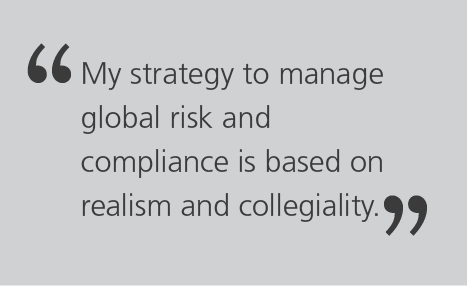Editor’s Note: Cheryl DiMuro, CPP, is the Director of Payroll at NTTDATA, and has been a payroll professional for more than 25 years. In 1995, she moved into management and eventually a director-level position in 2008. She obtained her Certified Payroll Professional (CPP) designation from the American Payroll Association in 2006.
How would you describe your strategy in managing risk and compliance on a global basis?
My strategy is based on realism and collegiality. Realize you are not the expert and will not become the expert by searching the internet. Reach out to leaders in the industry that assist companies in laws, regulations, compliance, wages, benefits, etc. Become an expert through industry leaders. Ask specific questions as well as for supporting documentation and best practices.
What are the key considerations in managing risk and compliance across your annual timeline?
Foremost, establish partnerships with all internal stakeholders: IT, payroll, HRIS, benefits, legal, finance. Make sure the right and left hand are on the same page and due diligence is done. If needed, partner with a local provider and make use of a translator to assist or use your company’s global accounting firm to assist in locating a resource that is local to the employee.
Although pricey, partner with legal on a global legal resource to help you understand the employment laws, benefits, and tax laws of the country you are trying to establish.
How would you advise a payroll director whose company is just beginning to expand to a global payroll?
They must realize that they are not the expert and can’t be the expert overnight. Although there are many resources that can assist in educating, leave it to the subject matter experts to assist until you have an enough exposure to become the new subject matter expert.
How is technology helping global payroll become more strategic?
Many more resources are available now, as well as vendors that assist with global payroll and recognize the need for end-to-end payroll processes that include all aspects of managing global employees. I have yet to see a dynamic, all-inclusive system that meets all needs.

There are several up-and-coming products that rely on third-party payroll providers as well as feeds and interfaces. Be careful, because global does not always mean that you can accomplish what you need through that one resource. Oftentimes, third-party vendors are involved for an end-to-end process. The ideal solution is one-stop shopping—where a global system is set up for the most common countries and is tax-compliant, performs standard calculations for that geographical location, knows the statutory regulations, can manage company-provided as well as socialized benefits, allows for bank wires, and creates the general ledger postings.
Specifically, be aware that some international vendors use third parties to source payroll and do not process it themselves, which is not optimal. It is preferred that you are dealing directly with the person(s) responsible for accurate payroll results as well as compliance.
What are the resources you feel are necessary to assist in the selection of vendors?
I truly feel that this territory in terms of vendors and resources is still very much unexplored with respect to end-to-end HR and payroll through financial reporting.
I would like to see the Global Payroll Management Institute expand in this area and provide resources as well as make recommendations—something as simple as a comparison tool of different vendors and options. There are resources that can assist with requirements in each country. Those recommendations can be used as a basis for acquiring a preferred vendor that meets most of the needs. Again, I have not seen an end-to-end product that manages all global employees.
Having a “global” HR system doesn’t mean that it will satisfy payroll needs as well as payment and general ledger. Most solutions I have seen involve a third-party vendor.
How did you become involved in global payroll?
Several years ago I was tasked with setting up payroll in 22 countries for sales and tech support personnel. Some countries had a couple of employees, while others had 200-plus. The only resources available then were local accountants, which were referred by local offices of big accounting firms.
 For those countries with several employees, there were payroll vendor options but they didn’t necessarily assist with managing the employees. At the time, HRISs were not broad enough for managing employees. As a result, payments were managed through finance. There, employees were managed in a completely different system that required solid communication and follow-up. Today, HRIS and payroll systems are better equipped to manage global employees, but there is still so much potential for systems that have built-in compliance, taxing, and management of benefits, payroll, and compensation.
For those countries with several employees, there were payroll vendor options but they didn’t necessarily assist with managing the employees. At the time, HRISs were not broad enough for managing employees. As a result, payments were managed through finance. There, employees were managed in a completely different system that required solid communication and follow-up. Today, HRIS and payroll systems are better equipped to manage global employees, but there is still so much potential for systems that have built-in compliance, taxing, and management of benefits, payroll, and compensation.
What kinds of training and education would be most useful for someone moving from domestic to global payroll?
There are vendors and resources to assist in educating U.S. employees in requirements for paying global employees. Oftentimes, they will connect you with a subject matter expert locally in the country where you are trying to hire employees. There are also local payroll vendors for smaller companies that will provide you direction, but it’s best to be educated proactively or to reach out to a subject matter expert to avoid any downstream impact (legal, compliance, tax, etc.).
What are key qualities you look for in people you hire?
Honesty, integrity, and exceptional customer service skills. Follow-through is extremely important. Lack of follow-through frustrates everyone and causes unnecessary escalations.
What are some of the unique aspects of running an efficient and effective global payroll operation?
Checks and balances. Solid processes that are free of gaps as well as thorough training to ensure accuracy and accountability. Documenting processes is essential.
What are areas of additional education and training you think will be important to global payroll professionals?
This is tough because there isn’t a single resource to educate you on the different laws and requirements in each country. The laws around employment, benefits, taxation, and payroll work hand in hand, therefore seeking answers is challenging and may have to be done for each country through a local expert or through a partnership with a large accounting firm with offices all over the world.
What strategies do you use in team-building?
Team-building is only possible when you take the time to know your employees and understand what makes them tick. Seek to learn what excites them, what motivates them, and how they prefer to communicate. For example, are they visual or auditory? Do they work better as an individual contributor or do they blossom on a team?
Through regular discussions with my employees, I strive to make them feel like they are on a team. I like to cross-train to add diversity to their job skills. I also like to keep them informed of upcoming changes in our company (those whom I am privileged to share with). Also, give them the ability to learn new things to keep them challenged. I listen to their issues and resolve what I can. I make it clear that I am not going to always be able to solve every issue, but the fact that they see me trying makes them feel that what they have to say is important.
How has your approach to change management helped to make a successful organization?
When change is coming, I like to review my staff, schedules, other projects, and skill sets and try to align what is ahead to the resources available to me. Identifying gaps early on allows you to fill those gaps or seek out the additional knowledge needed to get through them.
How do you balance work and pleasure?
It is not always possible. Knowing that will in itself relieve the stress. I say that prioritizing is huge. Make lists as reminders, and tasks should be in order of importance. Use your calendar whenever possible to assist with planning and reminders. This includes responsibilities at home. Plan around kids’ schedules to make sure you are there for them when it truly matters because family always comes first. Set achievable goals and timelines; don’t over-commit and under-deliver. I had to go through a lot of membership options to find a workout venue and schedule that aligns to my hectic life. I embrace challenges. I am a work-hard, play-hard type of person, and I enjoy exploring new things. Cooking and entertaining are my absolute favorite things to do. I started Zumba four years ago, and it’s my preferred type of exercise. When work is not so demanding, I try to work out at least six days a week.
 Frank J. Mendelson is an Acquisitions Editor for the Global Payroll Management Institute. He has been working with the American Payroll Association since 2009 as an editor for
Frank J. Mendelson is an Acquisitions Editor for the Global Payroll Management Institute. He has been working with the American Payroll Association since 2009 as an editor for PAYTECH
magazine, and has presented workshops at the Annual Congress on effective communication.